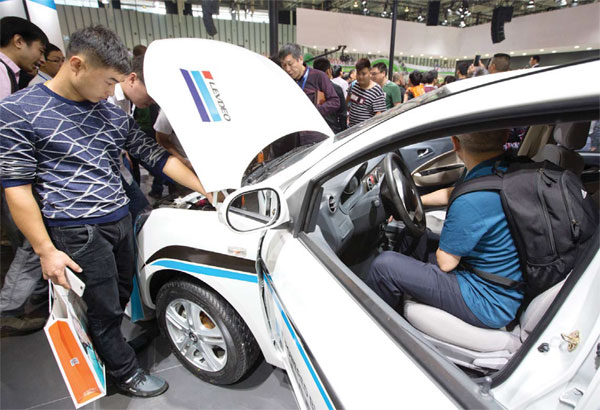Carmakers go into overdrive seeking new energy vehicle sales
|
Visitors check the electric cars at an exhibition in Nanjing, Jiangsu province, on Oct 17. Thanks to incentives and improved infrastructure, new energy vehicles are gaining popularity in the country. Su Yang / For China Daily |
Manufacturers stake a claim at the beginning of a journey full of promise
As China prepares to overtake the United States to become the world's biggest market for new energy vehicles, carmakers are expanding their offerings in the country for those ready to say goodbye to petrol-driven cars.
At two big motor shows in the country this year, one in Chengdu, Sichuan province, in early October and the other in Shanghai in April, carmakers including Geely Auto of China and BMW and Volkswagen of Germany unveiled dozens of new electric cars.
Even though Tesla Motors of the United States, a well-known maker of new energy vehicles, had nothing new to unveil at those shows, that does not mean it does not have big aspirations in China.
Tesla has made a name for itself worldwide with its premium cars, which might seem to make sales in the Chinese market a breeze. But the company has struggled to sway would-be buyers in the face of quality issues that caused the well-regarded organization Consumer Reports to drop its recommendation of the company's Model S.
Tao Rong, Tesla's spokesman in China, says increasing public awareness of environmental issues has helped raise the company's profile in the country since it entered the market in 2013.
"They know about the positive influence of green travel and are taking up the idea of energy-efficient and environmentally friendly cars, and that has helped us."
China and Tesla have a few things in common, he says, given that the company is based in Silicon Valley in Palo Alto, California, and China, like it, these days puts a huge premium on technology, innovation, green energy and environmental protection.
China compares favorably with the US as a market for Tesla, Tao says, because Americans, by dint of habit in a long established market, are seen to be harder to persuade to switch from petrol-driven cars than the Chinese in a market that is still developing.
The company aims to sell between 50,000 and 55,000 vehicles worldwide this year, compared with 33,000 last year.
Tesla does not make its country-by-country sales figures public, but Tao says that in China they are "very good", and that last year it sold "thousands" of cars.
"It's a great achievement for a young brand, and we are expecting more. Monthly sales rose rapidly in China in the first half of this year, and we reached our goal. China is playing an important role in Tesla's worldwide growth."
Tesla plans to put its SUV model, named Model X, on the Chinese market next year and do the same with Model 3, which is cheaper than the current Model S, during 2017 and 2018.
Unlike many carmakers that sell vehicles through dealerships, Tesla sells its cars itself, and in China it has outlets in Beijing, Chengdu, Hangzhou, Shanghai, Shenzhen and Xi'an. It plans to open five more outlets before the end of the year, it says.
Tao says Tesla has built the world's second-largest public charging network after the US for its car owners in China. It includes hundreds of charging stations and more than 1,400 charging posts in about 100 cities across the country.
China's biggest domestic new energy vehicle maker by sales is BYD, whose headquarters is in Shenzhen, and which produced its first car seven years ago. It says it sold 24,851 new energy vehicles in the first seven months of the year, more than thrice the number in the corresponding period last year and 36 percent more than for the whole of last year.
Sales of BYD vehicles accounted for nearly a third of all the new energy vehicles sold in China last year, and it exports two of its models worldwide.
In July the company signed a deal with Britain's largest bus maker, Alexander Dennis Ltd, to provide what are being called the world's first pure electric double-decker buses, five of which are due to be on the streets of London before the end of the year.
Because government incentives for new electric vehicles apply only to vehicles made in China, some international carmakers feel they need to form alliances with local carmakers.
In 2010 the German premium carmaker Daimler teamed up with BYD to create an electric car brand, Denza, combining BYD's battery technology and market know-how with Daimler's expertise in safety and quality engineering.
The first Denza model rolled off the production line in August last year, and a month later it opened dealerships in Beijing, Shanghai and Shenzhen.
This year, the company says, it plans to further expand its network in five cities and to have 13 sales outlets in eight cities by the end of the year.
"China is already the biggest automotive market in the world," a Daimler representative in Beijing says.
"We believe that the country has the vision, potential and absolute will to become the biggest new energy vehicle market in the world.
"Electro-mobility makes sense in particular in big cities, of which China has more than any other country in the world. Mobility in big cities can in principle also become challenging. Electro-mobility offers very good opportunities and solutions, so is strongly supported by the Chinese government."
Daimler has also formed a joint venture with the state-owned BAIC Group to produce Mercedes' first plug-in hybrid model in China, which will be on the market before the end of the year, the German company says.
Mercedes hopes to have the pure-electric model of its Smart car on the market in China next year, the company says, and is now in talks with relevant government departments.
duxiaoying1@chinadaily.com.cn



















